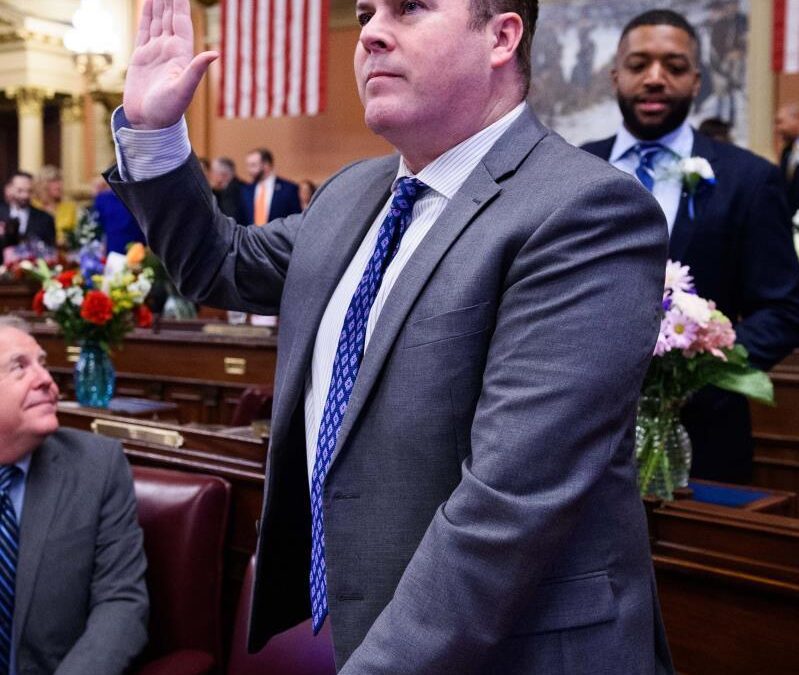
This week, Gov. Tom Wolf announced a new statewide initiative aimed at addressing mental health disparities.
In Pennsylvania, more than 1.8 million adults have a mental health condition. Yet, only four out of 10 report receiving any treatment in the past year.
That’s why Gov. Tom Wolf announced on Thursday a new campaign focused on mental health care across the state. The effort will involve a broad range of initiatives across multiple state agencies—similar to the way the governor has tackled the state’s opioid epidemic—and aims to reduce stigma and bolster resources and support.
“It’s the start of a new decade, and it’s time to start fresh,” Gov. Wolf said during a press conference at the state Capitol, according to the Pennsylvania Capital-Star. “We all know a Pennsylvanian who is struggling with hopelessness, anxiety, or depression, and [stigma] is holding many people back from seeking help.”
A statement from the governor’s office offered more details about the campaign, dubbed “Reach Out PA: Your Mental Health Matters,” and how the administration plans to tackle the barriers residents face when attempting to seek treatment. Among other things, the campaign intends to:
- ensure health insurance companies are meeting state and federal regulations that require mental health care is as accessible and affordable as physical health care (also known as mental health parity)
- find solutions to address the shortage in Pennsylvania’s mental health workforce
- host roundtable discussions with community organizations across the state to hear directly from people affected by stigma associated with mental illness
- increase support for children and young people by adding more social workers to schools
- and find ways to include “more trauma-informed approaches in education, health care, the criminal justice system and other government institutions.”
Thursday’s announcement was met with support from various advocacy organizations, including the National Alliance on Mental Illness (NAMI) Keystone Pennsylvania. In a statement, CEO Christine Michaels said they were “look[ing] forward to working with Gov. Wolf and state officials to spread the word that support does exist and you shouldn’t be ashamed to access resources.”
“We all know a Pennsylvanian who is struggling with hopelessness, anxiety, or depression, and [stigma] is holding many people back from seeking help.”
Rep. Mike Schlossberg, a Democrat representing the 132nd district, also supports Wolf’s plans. In a Facebook Live video, Schlossberg told viewers that the two most important issues raised during Thursday’s press conference were ensuring there are enough providers to take care of people who need treatment and mental health parity.
“There’s no point in having health insurance if your insurance isn’t going to adequately or fairly cover your mental illness,” Schlossberg said. “If we can get that one over the finish line, we can really do a lot of good for people who are ill.”
Mental health parity is, in fact, a huge problem across the country. Research shows that Americans have to go out of network for mental health treatment at far higher rates than they do for care related to physical health.
Schlossberg also said that he appreciated the way Wolf intends to tackle these barriers. “One of the things the governor said repeatedly is that he’s going to try to treat mental health in a similar vein to the opioid epidemic,” he said. “That involved running around the state, hearing from stakeholders, holding roundtable conversations, and ultimately that turned into a series of programs and dollars—real hardcore financial investments.”
“Money matters,” he continued. “Money matters deeply.”
In 2013, then-Republican Gov. Tom Corbett cut $84 billion in annual funding from mental health services. Since then, county-level mental health programs have taken a hit, and providers and advocates have tried unsuccessfully to get that funding reinstated.
David Measel is the director of Pennsylvania Peer Support Coalition. In an interview with COURIER, Measel called Wolf’s plan “a very encouraging first step.”
Among the most pressing concerns in Pennsylvania’s mental health care system, aside from the lack of available peer and crisis services due to funding cuts, is the need for the system in and of itself to be reworked, Measel said.
“We are working in a system that has not completely embraced recovery oriented services,” he explained. “A very useful tool in combatting stigma is shifting the system away from the old medical model of disease management to the more hopeful and empowering philosophy of recovery. Too many still hold outdated views of mental health, and until we overcome those attitudes, the stigma will persist.”
“We have to do a better job of educating everyone that recovery from a mental health diagnosis is possible and that there can be a full and rewarding life beyond a mental health diagnosis.”
Tackling the persistent stigma associated with mental health is long overdue, Measel said. “Those who have been working in mental health, especially those of us with lived experience with a mental health diagnosis, have been fighting this stigma for a long time, and it is nice to see the government acknowledging that it is a problem and taking steps to address it.”
Gov. Wolf will attend the campaign’s first roundtable discussion today, Jan. 3, at Muhlenberg College in Allentown.
Politics

Malcolm Kenyatta makes history after winning primary for Pa. Auditor General
State Rep. Malcolm Kenyatta, who was first elected to the state House in 2018, won the Democratic nomination for Pa. Auditor General and will...

Biden administration bans noncompete clauses for workers
The Federal Trade Commission (FTC) voted on Tuesday to ban noncompete agreements—those pesky clauses that employers often force their workers to...

Philadelphia DA cancels arrest warrant for state Rep. Kevin Boyle on eve of Pa. primary
Philadelphia District Attorney Larry Krasner said a detective had sought the warrant against Boyle, a Democrat whose district includes a section of...
Local News

What do you know about Wawa? 7 fun facts about Pennsylvania’s beloved convenience store
Wawa has 60 years of Pennsylvania roots, and today the commonwealth’s largest private company has more than 1,000 locations along the east coast....

Conjoined twins from Berks County die at age 62
Conjoined twins Lori and George Schappell, who pursued separate careers, interests and relationships during lives that defied medical expectations,...





